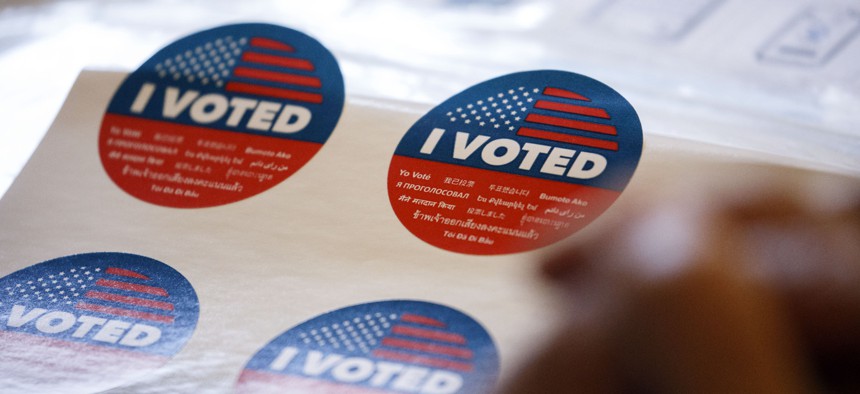CISA is coordinating with election security partners for Super Tuesday voting

Patrick T. Fallon/Bloomberg/Getty Images
The principal agency responsible for election security is asking public and private sector election administrators to share potential threat information as voters go to the polls.
The Cybersecurity and Infrastructure Security Agency will invite officials from federal, state and local election offices, as well as private sector representatives, to share information about potential security threats that may arise on Super Tuesday this week.
The CISA-led initiative, dubbed the Election Operations Center, will monitor primary elections across the U.S. amid heightened concerns about how nation-state hackers and other domestic threats could interfere with election infrastructure and other methods that track electoral information.
CISA, the principal federal agency that helps oversee election security, unveiled an election resources page last month, as reports of hacking and disinformation attempts from overseas are on the rise. Officials are also concerned that a loss of faith in electoral systems at home could lead to a repeat incident of widespread voter fraud claims during the 2020 presidential election that ended in the January 6 attack on the U.S. Capitol.
“As always, CISA stands ready to provide technical security support to the election infrastructure community,” the agency said in a statement.
Hackers seeking to harm election processes have mainly targeted campaign staff through emails, as well as identity-based attacks that abuse password recovery features to break into political media accounts or related targets, according to previously released analysis from the private sector, which adds that cybercriminals have also attempted to disable election-facing sites that display voter information or turnout results.
On the domestic front, content moderator staff reductions at social media companies have also been deemed a major risk to election integrity, and election workers worry they will face threats of violence from voters who don’t accept the polling results.
Election interference risks are not as novel as first reported nearly a decade ago, but officials and researchers fear that consumer facing AI tools or similar offerings available on the dark web will supercharge hackers’ attempts to breach election infrastructure or craft realistic-sounding, English language social media campaigns that seek to sway voters away from the polls or instill distrust in election outcomes.
U.S. voters got a taste of this last month when a Texas-linked robocalling operation allegedly disseminated phone calls featuring an AI-generated voice of President Joe Biden in the New Hampshire primary, urging Democrats to “save” their votes for the November ballot. The fallout ended in a total ban on AI voices being used in robocall schemes in the U.S that was led by the Federal Communications Commission.
A pending Supreme Court case would consider whether Biden administration agencies have the ability to stay in contact with social media companies about removing posts that could display disinformation. The case was fueled by allegations that agencies like CISA were unfairly pressing for the removal of content related to vaccine safety and election results.
Election administrators have repeatedly told lawmakers that more federal assistance is needed to safeguard voting systems and personnel from cyber and physical threats, though officials also say that any new funding for elections won’t have much use in 2024, assuming any such measure passes.
Former National Security Agency and Cyber Command leader Gen. Paul Nakasone told Congress in January that the November election would be the safest yet, adding he has not seen efforts to disrupt and interfere in the election process.
CISA Director Jen Easterly in that same hearing later said that the U.S. should “absolutely expect” foreign actors will attempt to influence elections, but stressed that Americans should still be confident in election infrastructure.






